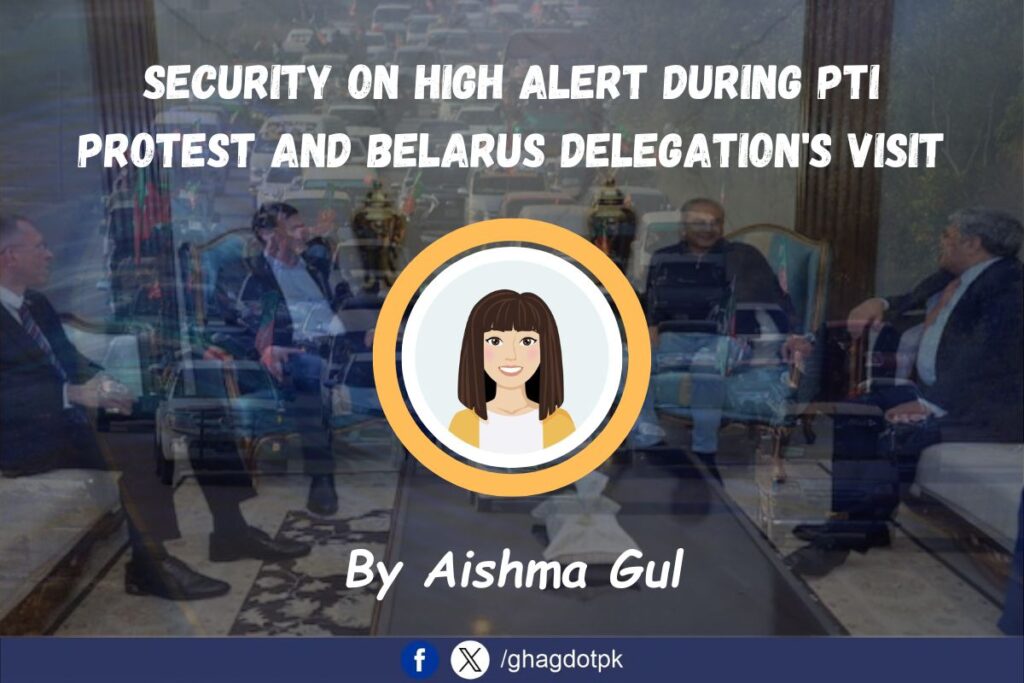By Aishma Gul
“In turbulent times, security is not merely a necessity; it is the bedrock of stability.”
Given recent developments, Islamabad is at the center of a complex security situation. The convergence of political protests and high-level diplomatic engagements has placed significant demands on Pakistan’s security agencies. Amid a heightened terrorism alert issued by the National Counter Terrorism Authority (Nacta), and the simultaneous arrival of Belarusian President Aleksandr Lukashenko for an official visit, Islamabad’s law enforcement and military forces are on high alert.
Nacta Alert on Potential Terrorist Threats
National Counter Terrorism Authority (Nacta) issued a terrorism alert in anticipation of possible attacks during the Pakistan Tehreek-e-Insaf (PTI) march in Islamabad. According to “technical and human” sources, terrorist groups, particularly those from Afghanistan, have entered Pakistan and are reportedly plotting “major activities” in important urban areas. Nacta responded by urging more monitoring in Islamabad, Rawalpindi, and other key Punjab cities.
Military sources refer to these terrorist groups as “Fitna-al-Khawarij” due to their destabilizing goal, and they constitute a major threat to public safety. According to Nacta, the PTI protest, which takes place along the same path as the Belarusian delegation, poses possible security risks. Interior Minister Naqvi emphasized the need to protect foreign visitors, adding, “Protecting foreign dignitaries is our priority,” while acknowledging the crucial timing of the PTI march during Lukashenko’s high-profile visit.
Belarusian President’s Arrival Amid Security Challenges
Belarus President Aleksandr Lukashenko’s visit to Pakistan with a 68-member team is a great opportunity to strengthen bilateral relations. According to the Foreign Office, this visit, which is scheduled for November 25-27, is part of an ongoing effort to improve Pakistan-Belarus relations. In September, Pakistan and Belarus reached an agreement in principle to develop a trade plan for 2025-2027, to increase cooperation in energy, natural resources, transportation, and military industries.
The Belarusian delegation includes senior ministries and prominent business leaders, emphasizing the country’s commitment to strengthening economic and strategic ties with Pakistan. The Islamabad High Court (IHC) has declared the PTI protest unlawful, ordering the government to avoid any disruption to public life and protect the safety of the Belarusian delegation.
Security Measures in Place: Balancing Diplomacy and Protest
Pakistani authorities have deployed personnel from the Frontier Constabulary, Rangers, and the police forces of Islamabad and Punjab to deal with the situation. Interior Minister Naqvi emphasized the importance of strict security measures, stating, “Nobody is stopping them [PTI] from protesting, but coming to Islamabad and protesting when a foreign delegation is visiting, the public can reach the conclusion that this is a terrible idea.”
While PTI supporters have the constitutional right to peaceful assembly, the closeness of the protest to foreign diplomatic activities raises additional concerns. Large-scale gatherings can heighten security concerns and divert crucial resources. Security agencies are thus tasked with balancing the PTI’s democratic rights with Islamabad’s safety and stability during this significant diplomatic engagement.
Economic Impact of Political Unrest
The economic implications of continued protests are difficult to ignore. Protests interrupt transportation, put local businesses at risk, and discourage foreign investment, all of which contribute to economic instability. Political rallies that require increased security deplete government resources that may otherwise be used to promote economic development programs, increasing economic losses.
In this complex security context, Islamabad’s law enforcement and military services face a difficult duty to secure public safety and the protection of foreign guests. The concurrent PTI protest and President Lukashenko’s visit highlight the necessity for a collaborative approach to maintaining stability. Given the current security scenario, authorities and political factions must collaborate to prioritize national security and economic development.






